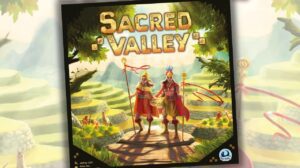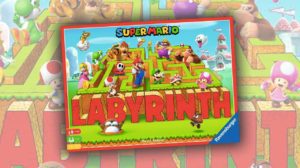Oak – Justin Bell
I was asked by a couple of friends to break out my “Shelf of Shame” copy of Oak, which had languished for nearly three months. Thankfully, I now know that Oak deserves a place in the permanent collection.
Over the course of five rounds, players will place their Elders (workers) on various spots on both the main board and their player board and maybe even tiles that are added by spending resources to create more choices. The production is fantastic, with cute accessories used to indicate an Elder that has been promoted with a special ongoing power like a satchel, cape or a set of antlers. Antlers!
The iconography is the game’s only major fail; too many games push to use icons instead of plain language to instruct players about what everything does, and Oak falls into this trap. Still, despite referring to the rulebook on literally every single turn in our four-player learning game, my first play of Oak took only two hours and 15 minutes. Future plays will be much faster, and I’m excited to explore the various paths to victory in this midweight Euro experience.
Ease of entry?:
★★☆☆☆ – Not an easy onboard
Would I play it again?:
★★★★★ – Will definitely play it again
Read more articles from Justin Bell.
Classic Art – Tom Franklin
Classic Art is the latest reskin of Reiner Knizia’s Member’s Only and Glenn’s Gallery, now matching the good doctor’s latest iteration of Modern Art.
In Classic Art, cards of five suits (or Art types? Galleries? Colors?) are dealt out, with extra cards being turned face up in added to the matching art type. Players then look at the cards in their hand and may make a prediction as to how many cards of that type will be played that round. On a turn, players play two cards from their hands face up in the respective art type and may make further predictions.
Scoring is done at the end of each round, with scores running from 1-10. The end of the game is triggered once all five art types have scores from any players, at least at the 5 mark. This means you’ll need to watch your scores and those of your opponents before trying to end the game.
Ease of entry?:
★★★★☆ – The odd bump or two
Would I play it again?:
★★★★☆ – Would like to play it again
Read more articles from Tom Franklin.
1212: Las Navas de Tolosa – Andrew Lynch
It’s not that 1212 is bad. It isn’t. It’s solid. The rules are straightforward enough, the manual is good, the player aides are terrific. Each player has slightly different rules for how their faction, either the Christians or the Muslims, functions, and you will have to adapt your playstyle. It is entirely possible to get stuck with a lousy hand of cards, which will heavily affect the outcome. The deck only has nine cards in it, which is the game’s long-term strength. That tiny deck allows for a quick adoption of card-counting, if you are so inclined, which is where the skill ceiling comes from.
On the other hand, in the middle of my first game, my opponent noted, astutely, “I feel nothing,” and that remained pretty much true throughout all of my plays. It seems, theoretically, like a close nail-biter is possible, but each time I’ve played, the winner has been apparent within a few rounds. The rest of the time, you’re just letting it play out.
Ease of entry?:
★★★☆☆ – There were a few questions
Would I play it again?:
★★☆☆☆ – Would play again but would rather play something else
Read more articles from Andrew Lynch.
Samurai Spirit – David McMillan
When my work buddy asked me to play Samurai Spirit with him one early morning before clocking in, I didn’t know what to expect. The name brought to mind another game called Age of War which is a samurai-themed, dice-driven, push-your-luck game of medieval conquest (all of which are things I am not a huge fan of). At first, believing Samurai Spirit was more of the same, I was reluctant to join him. But, when he told me that it was a cooperative game, influenced in no small part by Akira Kurosawa’s masterpiece Seven Samurai… well, I was immediately on board.
In Samurai Spirit, you and your companions are tasked with defending a small village against an onslaught of ruthless bandits. Each player controls a powerful samurai with its own unique ability and these abilities can be loaned out to other players for a single turn throughout the course of the game.
Bandits are drawn from a deck. Each has an attack power value and some target specific areas of the village. As bandits are drawn, the active player must choose to either take the hit to their health point pool or defend the section of the village the bandit is focused on. Each bandit that does damage to players is placed onto a stack and does even more bad stuff to the player on their next turn unless the bad stuff is dealt with in some way.
The game was exciting and fast paced. We lost our first playthrough. Too many bandits got through and one of our stalwart defenders paid the ultimate price, an outcome the game does not forgive. Then we immediately played again and fared much better. We pulled out a victory, but just barely. While we technically defended the village, there wasn’t much left of it to defend.
Ease of entry?:
★★★★★ – No sweat
Would I play it again?:
★★☆☆☆ – Would play again but would rather play something else














Add Comment